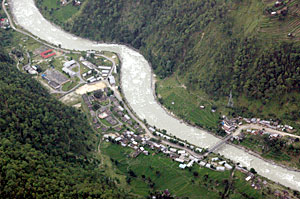 DAMBER K SHRESTHA |
Last week, Nepal Rastra Bank announced refinancing facilities for hydropower projects of up to 25 MW, under which the central bank agreed to provide banks and financial institutions credit at an interest rate of 6.5 per cent.
The institutions will have to re-lend the amount at interest rate not more than 10 per cent to hydropower investors. For this facility, the banks have been sent a directive to approach the central bank with loan demands placed by such developers.
This is a positive move on the central bank's side to provide relief to the ailing industry, hit by soaring costs. The fixed tariff rates in the power purchase agreement and ever increasing cost of funds have been troubling hydropower project developers and investors. Projects that had begun working at eight per cent interest rate were forced to pay even up to 15 per cent.
Twenty-eight hydropower projects promoted by the private sector had turned to the government, seeking relief measures. Many of them were in such financial distress that they were unable to pay the interest, let alone the principal amount of their loans. Projects, including Tama Kosi, Modi and Mai Khola, had formally applied to the Ministry of Energy to be declared 'sick' and to be provided relief packages such as relaxation in bank rates.
The response from the central bank has been received well, but this move is perhaps too little too late to fix the crisis. First of all, the facility has been provided for only six months, which is too short compared to the gestation period of hydropower projects. Hydropower developers argue that a special provision has to be made which will increase the time frame to at least three years.
Secondly, the central bank has provided an interest spread of 3.5 per cent to encourage financial institutions to invest in the sector, fixing the ceiling for interest rate at 10 per cent. Considering the need of the hour, the interest spread is perhaps too high. The financial sector has experienced a surge in liquidity and the overall interest rate has slightly decreased. In the last five months, commercial banks alone have collected an additional Rs 56 billion, but only Rs 21 billion have been invested in this period. Instead of hoarding this money, the banks should inject it into the market. In this scenario the interest rate for hydro developers can be lowered to less than 10 per cent.
The government could also ease the private hydro developers through external soft loans, as in the case of Trisuli 3A which is funded through a loan from China Exim Bank at the rate of just 1.5 per cent, payable in 20 years.
There are other ways to cut down the cost of hydro power developers. VAT is still levied on construction of the project, which increases the cost by 13 per cent. The Nepal Electricity Authority charges penalties to projects that supply less than the quoted range of electricity, even when the decrease is caused by natural decline in the water flow in the river. These charges can be eased. Instead, the government could charge income tax, which is waived right now, after the project starts earning.
The domestic demand for electricity has crossed 1,000MW, and the country has installed capacity of 70 per cent of the demand. During winter, these plants generate only a third of their capacity. As we head to daily 17 hours of power cuts, investing in hydro projects and easing hurdles of the developers should be top priority if we want to shed our load-shedding hours. Otherwise we will still be in the dark 10 years from now.
See also:
No light at the end of the tunnel, DEWAN RAI and RUBEENA MAHATO
The bad news is that the power crisis will get worse before it gets better
Read also:
Upwardly mobile
Nepal posts one of highest growth rates in mobile phones for TeliaSonera



